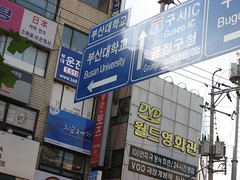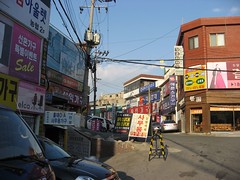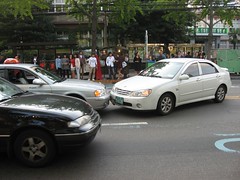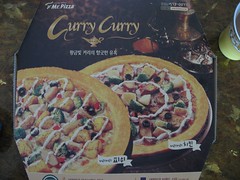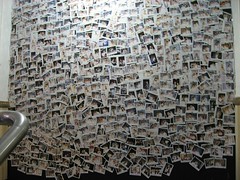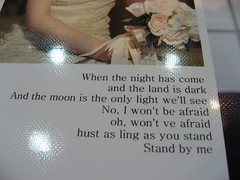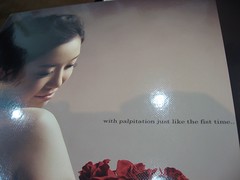"Chuseok is one of Korea’s most largely celebrated holidays. It is a time when families and friends gather to share food and enjoy their time together, giving thanks to their ancestors for the year's bountiful harvests." - Korea Tourism Organization
But there was no bountiful harvest for me on Saturday - except of misfortune;
Chuseok will now also be known as the day I caused the
Great Internet Blackout in our apartment, after the setting up of our intranet-based trading webserver went horribly wrong and stopped our self-sabotaging router talking to the outside world. So while I spent the the holiday trying to get us back online, Korean Mother, Brother and Wife whiled away the hours playing
our other British import - the Nintendo Wii. I wondered if I should care; it didn't feel like a holiday to me - I've spent much of the thirteen days since my return working to set up our new lives here and I don't particularly want to stop until everything is done.
The next day, we are in a taxi taking a Chuseok gift of several bunches of very large and heavy grapes to Korean Best Friend.
"Is he American?" asked the driver. Our eyes meet through the rear-view mirror.
"No - British" replies my wife. This is usually the point at which the tension in the air dissipates and we have a good-humoured conversation or I listen to criticisms aimed at my cousins from across the pond - instead this time there was something of a complaint heading in my direction.
"I had three British people in the back of my taxi not so long ago, and they ate!" - "Burgers!" he added with some disgust. I'm guessing this isn't the done thing in Korea.
"Do people eat in taxis in the UK?" Well, not as far as I know - but then maybe that's just because I don't know the kind of people who do.
I considered making an effort to apologise on my compatriots' behalves, but if I'm not on the their side, and I'm certainly not on the Koreans', where does this leave me? "Whose side are you on here?" I asked myself as I exited the taxi. "Mine". Or at least, I think I am.
So here's my plan: Best Friend's house, gift, leave, lunch at
Gimbab Nara, home, watch the
Japanese Grand Prix while continuing to work on setting up our computer network and attempting to fix the monitor which failed earlier in the week. I never watched Formula 1 in Korea despite it being on Korean ESPN, but started again when I was in the UK and I just haven't kicked the bad habit again yet. The plan advances as far as the Friend's house, where Friend's Mother is very happy to see us again.
"You look well". So I try to reply in Korean
"Listen, if I don't get some proper sleep soon in this noisy country of yours, I'm going to have a psychotic episode" but it comes out slightly differently as
"It's the weather".
"Ah well, yes, Korea has four seasons you know" - I attempt a swift riposte
"Oh come on, we are not going through this bovine excrement again are we? We get four seasons in a day in my former homeland", which I mistranslate as
"Ah yes, the FOUR seasons" - and nodding my head for effect. And then the food starts coming out. And I know what this means - there comes a moment when you cross the event horizon of a Korean social black hole, and you don't necessarily see it happen but after that your fate is sealed - there's no way out until you're put through the process and can possibly emerge as
Hawking radiation.
So here's their plan. At 1pm 4th Daughter will arrive with her boyfriend - who hasn't yet been formally introduced to her parents. This is, therefore, a major occasion in Korean culture; parental approval can make or break a potential marriage, and it's clear from the anecdotal evidence I've already been witness to that this is no mere rubber stamping exercise, but a real opportunity to make superficial, prejudicial and ultimately condemning judgements on the potential match for any unfathomable reason whatsoever. At 2pm Korean Best Friend and 3rd Daughter's soon-to-be husband will arrive and while that match is a foregone conclusion it's still suit-and-tie affair for the
groom-to-be. At 3pm 2nd Daughter will arrive with her new boyfriend, who will also be formally introduced for the first time. So if we don't get out by 1pm we're going to get sucked into this.
At
1pm 4th Daughter's new boyfriend arrives in his suit looking jumpy.
"I'm so nervous, I'm sweating!" And he really was - if you could bottle agitation he could have cornered the market. The pictures of the potential father-in-law hanging on the wall, showing him so proudly in his uniform with acres of medal ribbons across his chest, would no doubt have done little to calm his fears. And I thought I had it bad marrying the police inspector's daughter. Maybe not so much. After he settles down at the table Best Friend's Mother complains that 4th Daughter hasn't said much about him beforehand.
"Then ask me anything about myself" he says. The first question is
"What do your parents do?"
At
2pm Best Friend's future husband turns up.
"I actually got here 15 minutes ago - so I had to wait at the end of the street." he jokes - or does he? Best Friend's father is very particular about punctuality, which between that, and his background, may account for the afternoon's precision planning. I eat some rice cake but pass on the
abalone which I'm not a fan of - despite some insistence from the groom-to-be; I've played this game before and my go-to-hell smile is well practised. Except last time I played I was here as a prolonged visitor, this time I'm here with the intention of staying, so the game has changed, and not to my advantage. I turn to my wife and ask if I should eat it just to shock him. She thinks not, but I know the day is coming when I'm going to have to dive into this kind of Korean cuisine with gusto rather than picking at a dish here and there. In fact, while I may always be afforded some latitude, I know I have to become more Korean, and the terrible thing is that sitting there on the floor at that table, wondering if my aching out-of-condition Korean sitting muscles will ever let me stand up again, I knew that I'd already crossed the event horizon when I got on that plane and came out here two weeks ago. It was always going to be this way, but this is when I really felt the full horror of it - surrounded by seafood with my dead legs, rusty language skills and a fading smile.
Best Friend's Mother is friendly and familiar and she's really making an effort, which only serves to emphasise that I am the problem here. Or maybe she's getting too familiar - "Hands in my space! And... now... you have your arm around me." Did I mention I was British and in my culture... oh never mind. There is much laughter as my body language is unconsciously signalling my intention to escape. We're sitting on a bench by the table at this point, and Korean Wife seizes the opportunity of a distracted moment to grab hold of the top of my jeans pockets and belt and use them to discreetly slide me away across the bench from the
ajumma's immediate sphere of influence.
More food is on the table now - because it's coming in never-ending waves from the women in the kitchen - and this time Best Friend's Mother insists I try some decorated Korean sweet rice cakes before her. It's a trap, and not one I fall for - you should eat first - I tell her. She claps her hands in delight at this indicator of my growing assimilation.
Despite my protestations the Japanese Grand Prix had been put on the TV. I couldn't watch it without appearing rude and I couldn't not watch it without also appearing rude at the gesture. Shortly after 2nd Daughter's new boyfriend appeared at
3pm and he had been introduced and settled down at the table he asked those assembled
"Why are you watching this when there's no Korean playing?" So there you go
Bernie Ecclestone, you can hold your
Korean Grand Prix next year, but until a Korean driver gets put in one of those cockpits, don't count on anyone here really giving a damn.
My wife confided in me that she was sorry she didn't come from a large family to have this kind of gathering, and as though Best Friend's Mother read her mind as she counted off her daughters and their partners, she went on to indicate my spouse as her 'honorary' 5th daughter and therefore myself as her 'honorary' 5th son-in-law, offering the justification that
"even though he's a foreigner, he seems nice." Everyone laughs at the joke.
There were threats that a round of 'Go Stop' was going to break out, which as well as being the Korean driving style, is also a
popular card game. This was finally our chance to escape; Korean Wife was tired and while she may have harboured wishes of being part of a bigger family, her stamina for it was about as strong as my Korean sitting muscles.
By the time I left two Korean men had past their event horizons; if approved their futures were now locked into the gravitational influence of another Korean family. And one English man had realised he was finally locked into the gravitational influence of an entire society.






